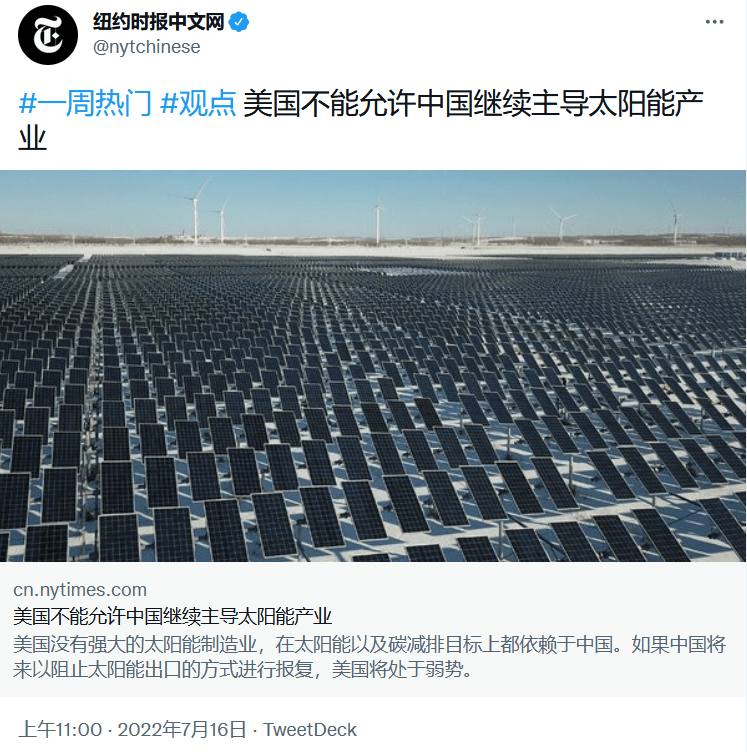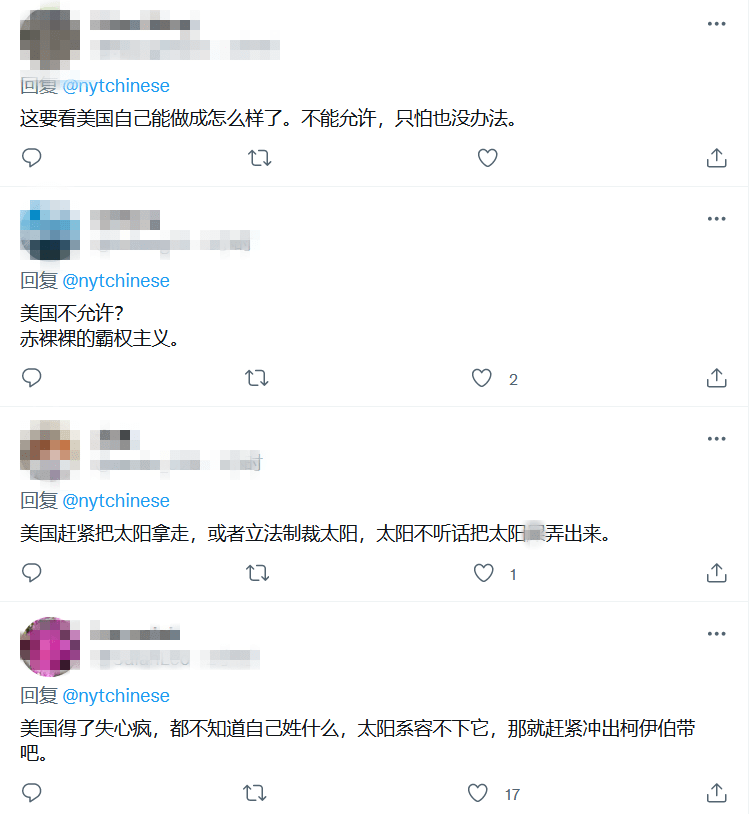风萧萧_Frank
以文会友美媒扬言“不许中国继续主导美国太阳能产业”,评论区太喜感了
2022-07-16 20:51
(观察者网讯)16日,美媒“纽约时报中文网”在推特上发布了,美国前副贸易代表罗伯特·霍利曼(Robert Holleyman)有关中美太阳能产业的文章,气急败坏嚷嚷着“美国不能允许中国继续主导太阳能产业”。
文章一如既往“泼脏水”的惯常操作,将美国太阳能市场的惨败怪罪于中国,煞有其事称是因为中国政府20多年来向其国内太阳能企业提供了“巨额补贴”,这才“直接”导致没有获得国家支持的美国太阳能产业被“压垮”了。
美国对中国太阳能产业的打压迄今已有十余年,主导的“双反”调查等一度令其受到致命性打击,但中国最终凭借自身努力逆风翻盘,如今成为太阳能产业的全球领导者。
这也让本文的评论区显得尤为喜感,不少人抱着“就喜欢你看不惯我又干不掉我”的心态来奇文共赏,嘲讽美国有些人是妥妥的霸权主义思想,诸如“美国干脆去制裁太阳吧”、“美国脸大到能把太阳包起来”、“太阳系容不下美国了”等逗趣吐槽层出不穷。

“纽约时报中文网”翻译的这篇评论文,英文原文发表于7月9日,标题为“美国不能允许中国继续挤压我们的太阳能产业”,作者是罗伯特·霍利曼(Robert Holleyman)。2014年至2017年,他在奥巴马政府中担任美国副贸易代表。
文章开篇就营造恐慌,霍利曼狂敲警钟称美国现在若还不在太阳能产业上下功夫,那么未来除了在减排方面要依赖中国以外,还有可能被中国在太阳能技术和产品方面上“卡脖子”。他还以小人之心度君子之腹,警告道若未来中国以阻止太阳能出口的方式进行报复,对中国太阳能产业深度依赖的美国将不堪一击,处于劣势。
紧接着霍利曼才慢条斯理开始“忆当年”,称美国自1950年代发明光伏技术后的几十年里在太阳能领域保持了毋庸置疑的领导地位。
随后话锋一转,他反手就把导致“美国太阳能产业巅峰不再”的这口锅扣在了中国头上——“如今我们的太阳能产业被压垮了,这是中国从2000年开始向其制造商提供巨额补贴的直接后果。”霍利曼认为,美国政府没有对其太阳能企业提供足够的支持,所以他们在中国面前没有竞争力。
同时他表示,美国商务部当下虽然正在调查中国太阳能企业是否通过第三方国家规避美国贸易法,但拜登政府6月宣布对来自东南亚四国的太阳能电池板免征两年关税,而这里正是许多中国太阳能厂商布局海外产能的地方。
霍利曼不满道,如果商务部发现中国确实在通过东南亚出口太阳能组件,拜登实际是在“接受潜在的贸易违规行为并放弃实施处罚”。他认为,拜登是在进行一场“赌博”,称从短期来看这项举措对美国太阳能制造商来说是一个权宜之计,但从长期来看会进一步加深美国对中国太阳能市场的依赖。
絮絮叨叨了一大堆“依赖中国的后果”,霍利曼才终于说出自己的目的:他是想在9月30日之前呼吁各界让参议院通过一项关于5500亿美元的清洁能源投资和税收抵免的法案,其中就包括对美国光伏电站投资的税收抵免和对重建美国光伏供应链的资金支持。法案目前已在众议院通过,但在参议院受阻。
霍利曼对这一法案将产生的影响非常乐观,他在文章中援引美国太阳能制造商的观点称,法案通过后他们可以在2030年之前将计划的太阳能部署全部完成。这些投资还将创建一个完整的国内太阳能供应链,生产100%的美国制造太阳能板。
临了,他还要再威胁一句:要是再让美国依赖中国的进口产品,代价就是牺牲美国的就业和可再生能源安全!

英文原文报道
一周过去了,霍利曼的原文报道没获得多大关注,直到“纽约时报中文版”16日发布了译文,以一句“美国不能允许中国继续主导太阳能产业”的无能狂怒,“喜提”网友花式神吐槽。
与作者的气急败坏形成鲜明对比的是,评论区里洋溢着欢乐的气氛。诸如“美国干脆去制裁太阳吧”、“美国脸大到能把太阳包起来”、“太阳系容不下美国了”、“美国不允许中国做的事多了去了,你不如赶紧许愿吧”……喜感评论层出不穷。


“就喜欢看你看不惯我又干不掉我的样子……”

美国不能允许中国继续主导太阳能产业
GUEST ESSAY
America Can't Allow China to Keep Crushing Our Solar Energy Industry
https://gaatimes.com/opinion-america-cant-allow-china-to-keep-crushing-our-solar-energy-industry/

Solar panels and wind turbines in Zhangjiakou, China. Credit...Greg Baker/Agence France-Presse, via Getty Images
By Robert Holleyman
Mr. Holleyman was the deputy U.S. trade representative in the Obama administration from 2014 to 2017.
A robust solar energy industry in the United States is crucial to the nation’s goal of a low-carbon future. But the prospects for solar energy are not looking bright these days, because the United States has allowed China to dominate the industry. Failure to create a strong domestic solar manufacturing industry leaves the United States and our carbon-reduction goals not just dependent on China, but also vulnerable should China block or threaten to block its solar exports as a form of retaliation in the future.
The United States was once a global leader in both solar innovation and manufacturing — we inventedphotovoltaic technology in the 1950s to power satellites and spacecraft. And we retained our undisputed leadership in solar for decades. But lately we have seen our solar industry get crushed as a direct consequence of China’s huge state subsidies to its manufacturers beginning in the 2000s.
Since then the U.S. share of solar component shipments worldwide fell to less than 1 percent in 2021 from 13 percent in 2004. China’s share of the production of solar components has increased over the past two decades from virtually nothing to nearly 85 percent today. For some solar components, that could rise to 95 percent in the coming years, according to a report this week from the International Energy Agency. Simply put, the United States did not provide enough support to its solar companies, which could not compete in the face of China’s state-directed strategy to control the market.
President Biden has called for measures aimed at increasing U.S. manufacturing of solar photovoltaic modules and components. Although the declarationfrom the White House never mentioned China by name, China and its market-distorting subsidies were at the heart of the orders. Mr. Biden certainly knows that the United States must not remain dependent on an unreliable third party and economic adversary for our national energy security.
Even as Mr. Biden called for investing in solar production, he took steps that furthered American reliance on China, at least in the short term. The Commerce Department has been investigating whether Chinese solar manufacturers are circumventing U.S. trade laws through third-party countries; even so, this administration declined to use trade enforcement by placing a moratorium on new duties for up to two years. As a result, the United States will effectively look the other way even if it is determined that imports from Southeast Asia are a result of Chinese tariff evasions. This decision to forgo enforcement might help solar installers in the short term, but it is a significant gamble since it is not accompanied by the essential elements needed to build our domestic solar industry.
To end our dependence on China, we must grow American solar production, and so Congress must reach a deal on a spending agreement that provides resources for large-scale clean energy development as well as solar manufacturing tax credits.
U.S. solar manufacturers claim that they could meet the entire projected solar deployment by 2030 if Congress passes clean energy funding and solar manufacturing tax credits. These investments would create an entirely domestic solar supply chain producing 100 percent American-made panels. Otherwise, we will perpetuate our dependence on Chinese solar imports and forever handicap American solar production.
Unfortunately, for the moment, the administration is giving up on enforcement and continuing our reliance on foreign solar while waiting for Congress to approve legislation to promote domestic manufacturing. If the Commerce Department finds that China is indeed illegally rerouting photovoltaic modules through Southeast Asia, President Biden will effectively be accepting potential trade violations and forgoing the imposition of penalties. This would give China a pass at the very moment when efforts to hold China accountable on trade, forced labor in the supply chain and national security are ramping up. And should Congress fail to act to spur the development of American solar manufacturing, our dependency on artificially cheap Chinese imports will grow.?
Failure to establish our own supply chains would be akin to the United States switching from relying on OPEC and Russia for energy to relying on China. Aside from the consequences of the leading solution to unabated climate change being subject to the whims of a foreign power that doesn’t play by the rules, Americans will be shut out of the high-quality manufacturing solar jobs that will come about from this transition.
In a matter of months, we will know whether the Biden administration’s gamble pays off. Sept. 30 is the deadline for the Senate to pass a reconciliation bill that includes clean energy funding and solar manufacturing tax incentives. But whatever happens, one thing is clear: The White House and Congress cannot perpetuate America’s dependency on Chinese imports at the cost of American jobs and renewable-energy security.??
Robert Holleyman was the deputy U.S. trade representative in the Obama administration from 2014 to 2017.




